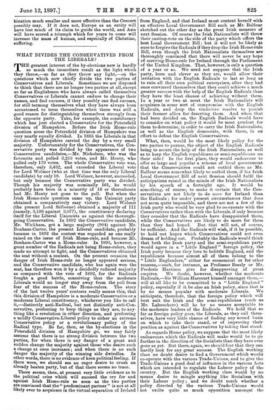TOPICS OF THE DAY.
THE STRUGGLE IN CONSTANTINOPLE. THE British public is still watching the protracted struggle in Constantinople, and still making a mistake which impairs its judgment as to the probable progress of events. It assumes as a datum which need not be discussed that if the six Great Powers who make lip what it is convenient to call the " Concert " of Europe order the Sultan to evacuate Thessaly, he will evacuate it. That is a sound assumption if the Concert is prepared to employ force ; but if it is not prepared, then the assump- tion is nothing better than a more or less pious hope. The Turks understand war better than they understand anything else, and are not prepared to resist the Concert in arms,—that is, to destroy an Austrian army in Thessaly. a Russian army in Armenia, and a Franco-British fleet off Constantinople all at once. They know they cannot do it, and as their system allows them to submit to force majeure —the decision of battle being always with them the decision of God—they would, if the Concert would fight, accept the order more or less sullenly and retire. But it may almost be taken as certain that the Concert will not coerce, and in that case the Turks are bound by their Sacred Law, as well as by their pride as a conquering and dominant caste, to remain in Thessaly, and they will remain. They do not care about forms, will readily promise to retire when the in- demnity is paid, or will call their conquest "a rectifi- cation of frontier" if you like, but they will remain, ruling and taxing and planting Mussulman colonies from Macedonia to the Othrys ridge. Why should they not ? Their armies cost very little, they have all Thessaly to eat up, and so long as their armies are victorious they can levy throughout the Empire almost any taxes they please. They will not be at all hurt by the anger of diplomatists, will indeed find in it matter for chuckling over, and they are not in the least afraid of future consequences, which, they will piously remark, with a resignation by no means wholly insincere, are in the hands of God. In short, if the Concert will not fight, as it certainly will not, the Sultan will keep Thessaly, where he has already established an administra- tion so complete, and so palpably intended to last, that it includes a. bureau "for the service of the Public Debt."
The true question, therefore, for the public to consider is whether there is any probability that another and smaller combination will form itself in Europe strong enough to apply military and naval pressure to the Sultan. In spite of many adverse circumstances, and of an extra- ordinary quantity of adverse rumours, invented in part at least by Turks and Germans, we feel by no means satisfied that such a probability does not exist. It may be taken as certain that Great Britain, France, and Italy, though impelled by somewhat different motives, are heartily hostile to any extension of direct Turkish rule. Apart altogether from the philanthropic question, though that is unusually serious, massacres producing deep popular excitements, we have to fear Turkish ambition on account of Egypt, and France has to fear it on account of her vast Mussulman dominion in Northern Africa, and Italy has to fear on it account of her hopes of Tripoli. The three Powers may therefore be relied on up to a point, but they will, in spite of their immense combined strength, be unwilling to act alone. That might drive the three Emperors into alliance, and produce a situation which, though without terrors for us, would be very terrible, reasonably and justly terrible, to France and Italy. The Parliamentary Powers must find an ally, and as Germany under its present Government detests them for their freedom, and Austria is unable to detach itself from Germany, that ally can only be Russia. The case, there- fore, will be pronounced by the majority of our readers hopeless ; but that is not quite so certain. The Govern- ment of Russia, no doubt, is not philanthropic ; it greatly wishes to postpone any deadly blow at Turkey ; and it is suspicious almost beyond reason of the motives of the Western Powers. Nevertheless, it may join them. St. Petersburg perceives with excessive, and from its point of view quite natural, irritation that the German Emperor is ousting it from its old ascendency in Constantinople, and that Turkey is reviving under German tuition to a degree which may make it once more a formidable military Power. So strong is this feeling that, according to an account which looks to us true, M. de Nelidoff has re- monstrated with the Sultan against a project for creating a Turkish fleet, and has received a rebuff couched in terms- of unexpected frankness, and even hostility, Abd-ul- Hamid asking an explanation of certain preparations at Odessa. It must, moreover, be most galling to the pride of the Russian Emperor to see that his advice is rejected, and that his attitude as the friend of the Greek dynasty counts for nothing in Yildiz Kiosk. The Czar ranks below the Kaiser now at Constantinople, and the Czar is not accustomed to that position. And lastly, there is the- opinion of the Russian people, which is not so entirely neglected in the Winter Palace as it is the custom to suppose, especially when the opinion of the people and the feelings of the Monarch point in the same direction. The Russian people undoubtedly displayed an unexpected callousness to the sufferings of the Armenians ; but then the Armenians, though Christians, are heretics, they are bracketed in Russian imagination with Jews, and they are suspected of secret hostility to Russia. The people of Thessaly, on the other hand, belong to the Holy Orthodox Church, they are so little hostile to Russia that the dynasties intermarry, and they share in one of the strongest of Russian popular feelings, abhorrence of the Turks. It is at least possible, therefore, that the Russian Court may be inclined to insist on obedience from the Sultan ; and if it does, what has it seriously to dread ? As we believe, absolutely nothing except a war with Turkey, which if victoriously pursued would enable it, in the present state of British opinion, to carry out fully the cancelled clauses of the Treaty of San Stefano, a result which would make- every Russian proud and happy. The assumption that Germany, with France on her flank, and England every- where, would actually invade Russia in order to conciliate Turkey or humble Greece, seems to us very dreamy, to be, in fact, a proposition which ignores the fact that the German people die in the German armies, and consequently, when. the war is not one to resist invasion, have a word to say in the matter. We are not, therefore, entirely hopeless,. and we can, we think, produce one rather weighty bit of evidence on the side of our view. The Turks do not expect support from Russia, and are arming against pressure from her side. They are accumulating troops on the frontier of Bulgaria, whose Army, if Russia moved, would be her advanced guard ; and they have just called. out a new mass of Reserves, always their best soldiers, in order to strengthen the forces upon the Armenian border. Those forces are always considerable and always fairly supplied, and cannot be assailed, or even menaced, by any Army except the Russian. It may be said that the Sultan's character is opposed to so resolved a course of action ; but the Sultan has twice faced war, in 1877 and 1897, and has recently, we strongly suspect, received hints from his great soldiers which, for the time at all events, greatly limit his freedom of decision. There is no perfect despotism in the world, not even the Salvation Army ; and in all Asiatic countries at all times, and in the greater part of Europe at the present moment, the opinion of the, Army, when that opinion is earnest, weighs heavily with the rulers of the State.
We need not say that we are making no attempt to dogmatise about the situation, which may at any moment be materially changed. There are probably not five persons in Europe outside the Winter Palace who. know accurately the tendencies of the present Czar's mind, and not three who can calculate with confidence on the working of the welter of forces now struggling for mastery in Yildiz Kiosk, where, it must be remembered, " mastery " involves the power to distribute sentences of exile and death. Under such circumstances it is vain for any journal to do more than gravely consider the apparent facts ; but among the facts those we have quoted are important, and are in great part forgotten. It is next to impossible that Great Britain, Russia, and France can at this moment be quarrelling, for their larger interests are identical ; and if they are agreeing, they direct a mass of power, actual military and naval power, not imaginary "influence," before which both the Sultan and the ally on whom his Generals place reliance may be compelled. to recede. That the Concert will save Thessaly to civilisation we are unable to believe, for it will not use physical force, and to moral force the Ottomans never yield ; but a, corn- bination much smaller and more effective than the Concert possibly may. If it does not, Europe as an entity will have lost much of its claim to guide the world, and Asia will have scored a triumph which for years to come will increase the mass of human, and especially of Christian, suffering.



































 Previous page
Previous page